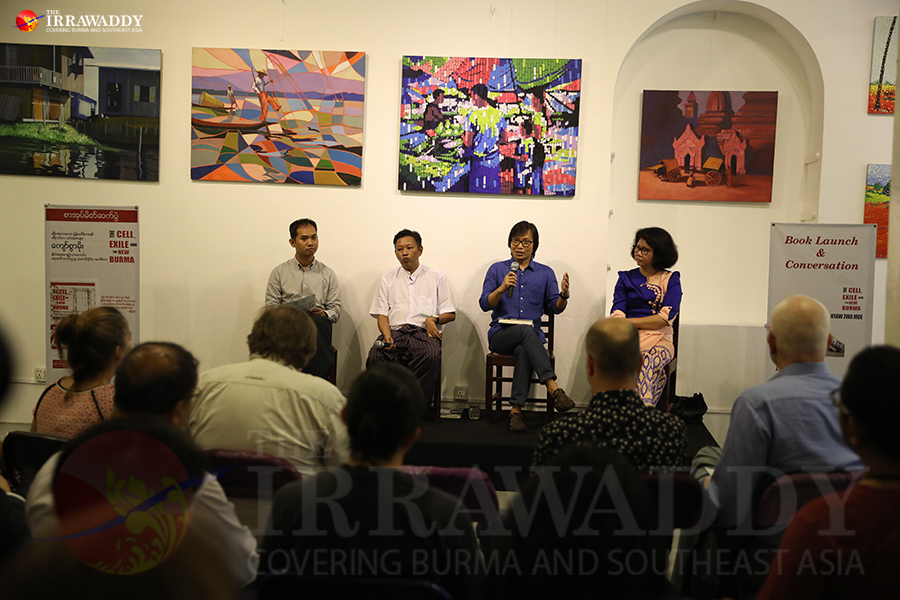YANGON — Like many people who came of age in the late 1980s in socialist Myanmar, Kyaw Zwa Moe has witnessed, and been directly involved in, dramatic shifts in the country’s politics.
As a pro-democracy student activist, he was sentenced to 10 years’ imprisonment. He served his term and by the early 2000s found himself in Thailand, working as a journalist for The Irrawaddy. As veteran Swedish journalist and Myanmar expert Bertil Linter, who has known him personally for many years, recalled recently, Kyaw Zwa Moe developed a reputation for covering Myanmar-related issues with diligence and empathy. In 2013, he returned permanently to Yangon as senior editor of The Irrawaddy English edition.
What sets Kyaw Zwa Moe apart from many others who have lived through imprisonment and exile is his commitment to documenting and recalling his prison ordeal, along with the evolution of Myanmar’s political situation and the lives of the many people he encountered along the Thailand-Myanmar border. His reporting continues amid the country’s current democratic transition.
On Tuesday in Yangon, he officially launched his book, “The Cell, Exile and the New Burma”, a selection of 37 of his journalistic works, comprising feature stories and essays written for The Irrawaddy from 2001-17.

The author describes the book as a reflection on Myanmar’s unfinished struggle to achieve democracy, and believes it can be read as both a historical reference on the country’s politics, past and present, and a creative work with literary qualities.
“While [the stories] were written over a span of many years, they can connect you with what and where Myanmar is today. They are aimed at local and international readers who want to understand more about the country’s politics,” he said.
Readers should not be put off by the book’s serious subtitle: “A Political Education amid the Unfinished Journey Toward Democracy.” While the political forces at work in Myanmar, today and in years past, can be discerned in every story, the book is not a series of dry lectures on “isms” and democracy. Rather, it is a collection of feature stories that illustrate the harsh realities of a political prisoner’s life behind bars and bring you face to face with refugees, migrant laborers, ethnic armies, drug addicts, sex workers and other residents of border towns in Thailand and China.
In this book’s pages you’ll hear first hand from “long-necked” Padaung women on display in human zoos in Thailand who dream of escape and an education; a middle-aged Karen couple who lost six children in their decades-long flight from conflict and cling to a fragile peace; a would-be political assassin who describes his brush with history; an aging former driver as he recalls ferrying General Aung San to his historic 1947 summit in Panglong; and many others. If you are curious to learn more about the country’s ongoing democratic transition, commentaries in the book will deepen your understanding of, for example, the delicate maneuvering that defines political life in Naypyitaw, where the efforts of the country’s de facto leader, State Counselor Daw Aung San Suu Kyi, to strike a deal with the powerful military on nearly every front could serve as an emblem for Myanmar’s unfinished struggle to achieve democracy.
At Tuesday’s book launch, which was attended by members of the international diplomatic community, political observers and journalists, political prisoner-cum-writer Ma Thida (Sanchaung) said she appreciated the book because without knowledge of the past, people can’t aim for a better future.

“That’s why we need to learn every single story of our country, not just about political prisoners and people in exile but also from others, with honesty,” said the author, who has also penned a work about her prison days.
In short, “The Cell, Exile and The New Burma” is about Myanmar and its people, and how they have shaped and been shaped by their country’s politics since 1988.
As historian and writer Thant Myint-U points out in his foreword, we are at a critical juncture in Myanmar’s history. Therefore, this is a moment for reflection and introspection, for reassessing the recent past as well as the country’s deeper history, and for trying to see developments from as many perspectives as possible.
“For these reasons, the publication of Kyaw Zwa Moe’s book is very welcome and should be of interest to anyone trying to gain a better sense of Burma today in all its wonderful and often frightening complexity,” he writes.
The book is now available at major bookstores in Yangon.

















